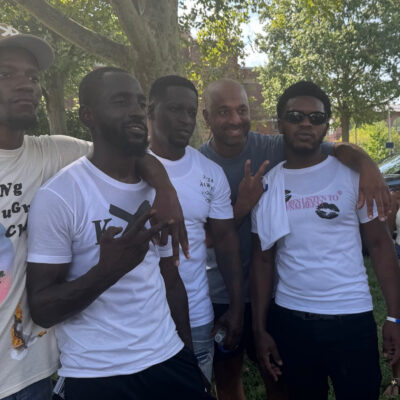In theaters now and well worth a watch, “Kneecap” joins a long list of musical biopics that explore how various artists, groups and phenomena got to where they are today. It's a hilarious, playful and serious success, a little messy but with enough verve and authentic filmmaking to carry the familiar elements through.
“Familiar” here is relative. Kneecap, a real-life hip-hop three-piece band from West Belfast, Northern Ireland, have settings and stories that aren't directly comparable, but the kinetic imagery of 8 Mile, Straight Outta Compton, and Trainspotting finds its way into writer-director Rich Peppiatt's feature film. In 2017, five years before Gaelic became legal in Northern Ireland, Kneecap's Mo Chara and Moglai Bop, along with DJ Provai, belted out anti-British, anti-colonial, pro-drug, and generally pro-hedonism lyrics in a succession of unlikely venues, mostly in the historically banned Irish language.
The backdrop for “Kneecap” is, inevitably, the political struggles of the Emerald Isle, specifically Belfast's “Troubles” (a ridiculous term, given the magnitude of the Troubles). The film's freely but creatively fictionalized version of events takes the usual Belfast bleak clichés in the opening seconds, cramming newsreel shots of bombed buildings and exploding cars into a one-off quickie that gets it out of the way. Director Peppiatt strikes a deft balance throughout “Kneecap,” treating much of it to black humour and frenetic myth-making while still playing up the human peril realistically where necessary.
Bap's off-stage stage name is Naois Ó Cailhaigne; he plays himself in “Kneecap,” as does his best friend and fellow rapper Liam Óg Ó Hannaigh, aka Mo Chara; they're both easy-going, engaging screen actors. Music teacher and Irish language activist JJ Ó Duchaltaigh, aka DJ Provaigh, is also a notch or two above him. The film's brisk, gritty story has a lot going for it, running about 100 minutes, including a subplot about Bap's fugitive father, played by Michael Fassbender, who is wanted in connection with multiple car bombings involving the IRA.
This is all recent and tumultuous history: Kneecap and its international popularity with millions of people around the world who love the anti-establishment and want to smash the system began just three years before the COVID pandemic. (Kneecap's next Chicago concert, at Concord Music Hall on September 27, is nearing a sell-out.) The film includes just the right amount of rehearsal and concert footage, with playful English subtitles popping up mid-song and more conventional subtitles for dialogue scenes.
Even if Kneecap has a somewhat forced sense of overblown comedy and some predictable dramatic beats in the final third, its visual ingenuity triumphs because it so comfortably combines with songs of protest and liberation. It moves along smoothly without a trace of solemnity, whether it's describing sex, “stealing $20 from your dad” for cocaine, drug dealing (which these guys did), focusing on the beauty of words, or portraying the more exploratory, poetic side of life under siege.
You can enjoy “Kneecap” without thinking about the politics that made Belfast what it is today, but that's not a very good way to watch a film that is, at its core, inescapably political.
“Kneecaps” — 3 out of 4 stars
MPA Rating: R (for widespread drugs, language, sexual content/nudity, and some violence)
Duration: 1:45
How to watch: In theaters now
Michael Phillips is a Tribune critic.
First published:










